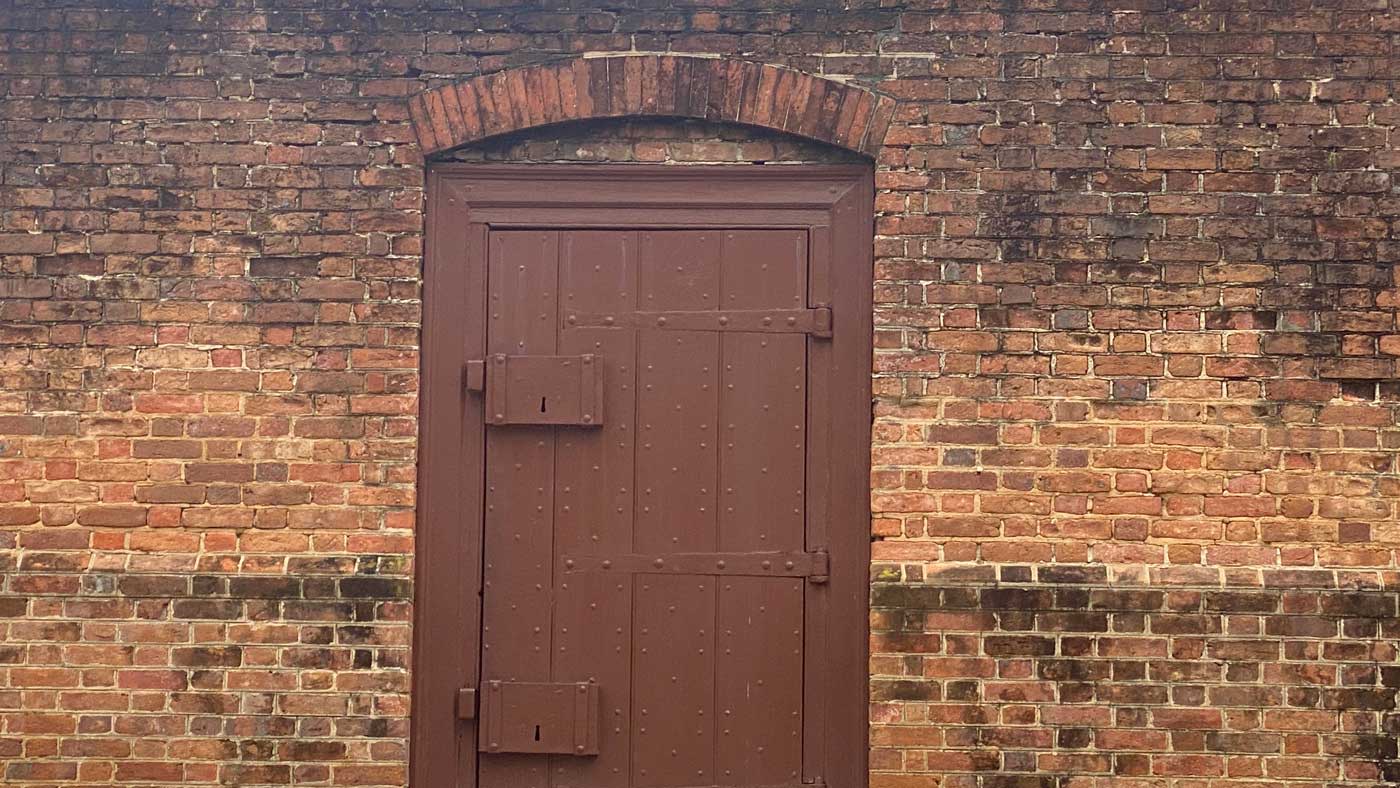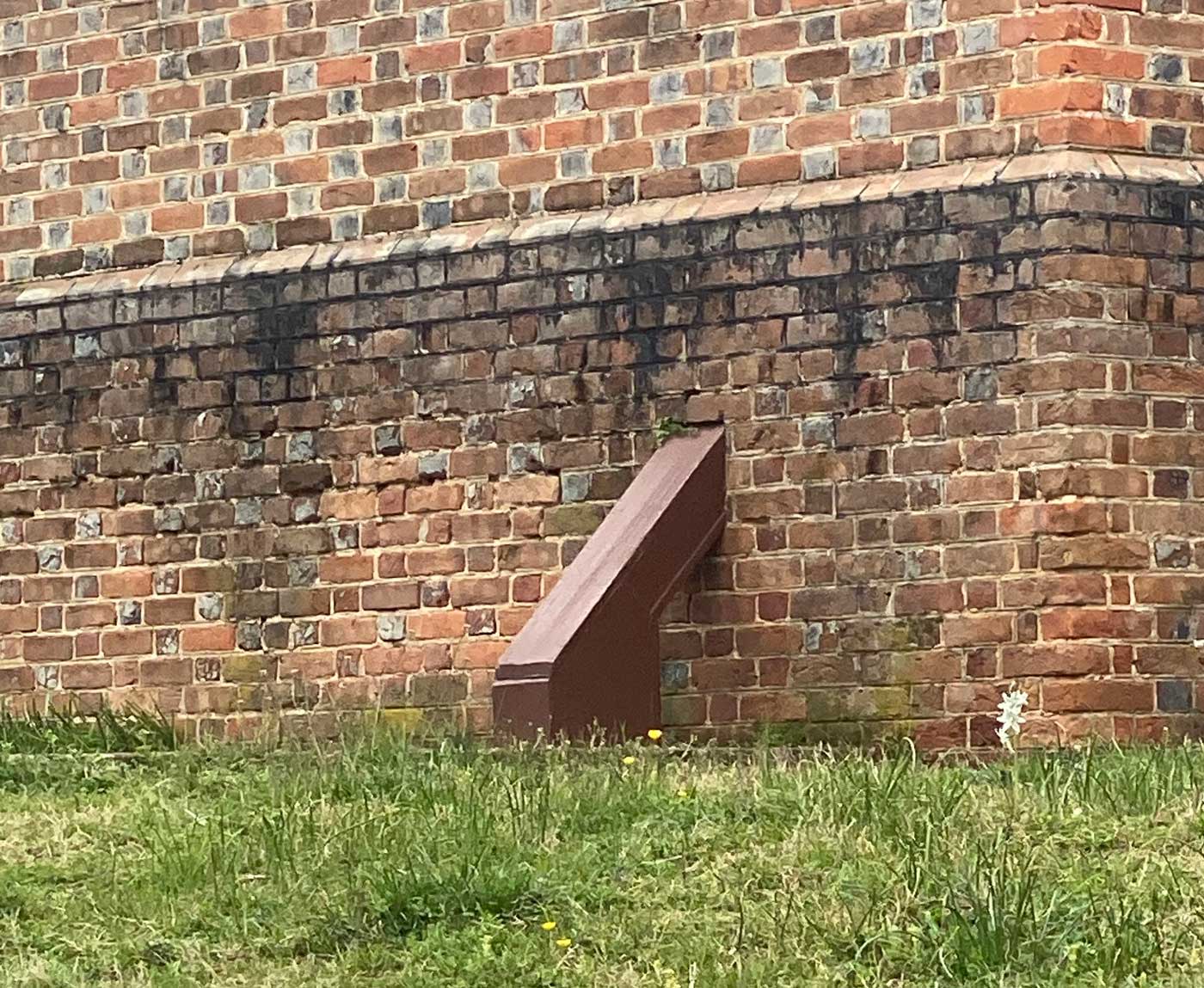An Escape and the Imagination
It is the summer of 1752 and John Sparks, a convicted murderer, sits sweating in his cell at the Public Gaol in Williamsburg awaiting his destiny at the gallows. Perhaps his mind races with images of himself in his final moments at the end of the rope as a crowd of spectators watch and judge him. Perhaps he hears the voice of a woman in the crowd asking her husband why the man is being executed. The husband answers in a vague flat tone that the convict is hanging because he is a vile criminal and his punishment should be a warning to all that defying the law is not to be tolerated. Being angry and fearful, Sparks makes a bold decision to try to escape his fate.
He gets the idea to saw off his irons using materials that are available to him in the cell. He carefully and quietly begins the process. He holds his breath and hopes that no one will hear what he is doing. Finally, the chain gives way and he is able to move more easily. He continues to plot his escape in his mind as he awaits his opportunity to run. He sits eagerly listening and anticipating the arrival of the gaoler at his cell door. Footsteps! Sparks readies himself.
The key is inserted into the lock and he hears it click. The door begins to open. Sparks grabs the quart bottle he has been saving for this moment. The Keeper of the Public Gaol, John Lane, begins to enter the cell. Sparks holds his breath as he raises the bottle and brings it down with a heavy thud upon Lane’s head. Lane falls to the floor. Sparks jumps over the prostrate Lane and begins to run. His heart pounding, he flees into the darkness that is descending upon Williamsburg. He does not look back. He is free. Or is he?
Ok, so I took a little (or a lot of) dramatic license with this story. But, the foundation of this tale is true and comes from a July 3, 1752 Virginia Gazette:
“On Wednesday last, John Sparks, confin’d in the Public Gaol, under Sentence of Death, for the Murder of James Fox, contriv’d to saw off his Irons in the Day Time, and at Night, as soon as the Gaoler open’d the Prison Door, knock’d him down with a Quart Bottle, and made his escape. ————He was apprehended Yesterday Evening, and brought this Morning, and to prevent a Possibility of his escaping the Justice his Crime deserv’d was this Day executed at the Gallows. ———He confessed himself guilty of the Murder, but entirely acquitted James Trotman, who was sentenced with him at the same Time, and whose Execution is respited."

You may be wondering why someone who spends his days discussing the importance of history and understanding the past through facts felt compelled to embellish this event. The answer can be summed up in a single word, “Discovery.” Using the imagination to visualize an occurrence can lead one to further investigation and a deeper understanding of an event or person.
As we read and study about events that occurred in the past, it is normal for questions to arise. Typically, when we read for pleasure, we acknowledge situational questions briefly and let them go. We don’t like to get too bogged down in the details when we are reading about the adventures of a hobbit on a quest. However, when you begin to attempt to better understand an event, there are many things to consider and using the available details to paint a picture can open up further areas for discovery. For example, if we use the Virginia Gazette article above, one might ask the following questions.
- What exactly did Sparks use to saw off his irons?
- How did he have access to something sharp enough to use as a saw?
- Why did he have a quart bottle? Who allowed him to have it?
- What happened to James Trotman?
- What happened to the family of James Fox?
- Why does everyone in this story have a first name that starts with the letter, “J”?
So, now that we have the questions, what are the answers? This is where the fun begins and the writer has the lamentable duty of telling you, the wonderful reader, that research and investigation are the next part of the journey. Or, to put it plainly, I don’t currently know.
Hold on. I can hear you yelling at your computer or mobile device. Before you get too angry with me, let me explain.
History is filled with many fascinating stories that contain gaping plot holes, but sometimes the answers we seek may not be readily available. While it is possible to make assumptions about an event based upon general knowledge, that can be dangerous and may not really speak to the facts of the situation at hand. We must approach each event with integrity and seek the truth. Sometimes the questions will remain unanswered for many years or an answer may never be truly discovered.

Why not use your imagination with this escape from May 1775 that even had the the Royal Governor involved? I’m curious to know what you come up with.
By his Excellency the Right Hon. JOHN Earl of DUNMORE, his Majesty’s Lieutenant and Governor General of the Colony and Dominion of Virginia, and Vice Admiral of the same:
A PROCLAMATION.
VIRGINIA, to wit,
WHEREAS I am informed that JAMES HOPKINS, who was committed to the Public Gaol from the County of Orange, to take his Trial at the General Court for Horse Stealing, did last Night make his Escape from thence: The said James Hopkins is a stout well made Man, about 5 Feet 10 Inches high, has a Scald-Head, and had on an Osnabrug Shirt and Trousers; he has usually wandered about the Country, some Times pretending to be dumb, at other Times to have lost the Use of his Limbs, and at others assuming the Office of a Baptist Preacher: In Order, therefore, that the said James Hopkins may be brought to Justice, I do hereby offer a Reward of TWENTY POUNDS to any person who shall apprehend and deliver him to the Keeper of the Gaol aforesaid.
GIVEN under my hand, and at the Seal of the Colony, at Williamsburg, this 11th Day of May, 1775, and in the 15th Year of his Majesty’s Reign.
DUNMORE.
God Save the King
Brandon Lyles is a Lead Interpreter with School and Groups and is a performer in the evening trial programs. He has been with Colonial Williamsburg since 2016. He spends much of his free time engaging in philosophical conversation with his dog, Sheldon, while his wife, Amy, shakes her head in dismay.
While our historic sites closed temporarily, the research continues! We invite you to join us in exploring The John D. Rockefeller Jr. Library’s digital collections and use your imagination a little!
Resources
1. Virginia Gazette: Hunter: July 3, 1752 – page 3, column 1. Accessed here.
2. Virginia Gazette: Dixon and Hunter: May 13, 1775, page 3, column 2. Accessed here.
